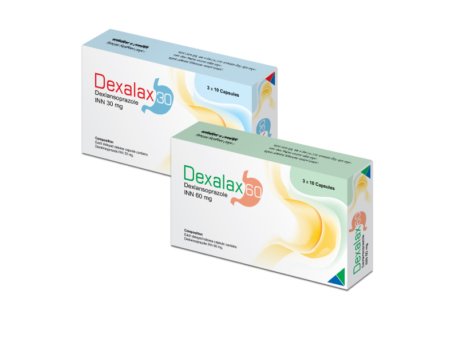
Type:10 Capsules
Generic Name:Dexlansoprazole
Manufacturer:Delta Pharma Limited
Price:৳120.00
Oesophagitis, Gastro-oesophageal reflux disease (GERD)
Capsule: May take with or without food DR: Take at least 30 minutes before a meal
Erosive Esophagitis Capsule: Indicated for healing of all grades of erosive esophagitis (EE) and maintaining healing of EE DR: Indicated for maintaining healing of EE Healing (capsule): 60 mg PO qDay for up to 8 weeks Maintenance (capsule or DR): 30 mg PO qDay for up to 6 months Gastroesophageal Reflux Disease Indicated for treating heartburn associated with symptomatic nonerosive GERD Capsule or DR: 30 mg PO qDay for 4 weeks Hepatic impairment Milde (Child-Pugh A): Dose adjustment not necessary Moderate (Child-Pugh B): Not to exceed 30 mg/day Severe (Child-Pugh C): Not recommended
<12 years Safety and efficacy not established >12 years Erosive Esophagitis Capsule: Indicated for healing of all grades of erosive esophagitis (EE) and maintaining healing of EE DR: Indicated for maintaining healing of EE Healing (capsule): 60 mg PO qDay for up to 8 weeks Maintenance (capsule or DR): 30 mg PO qDay for up to 6 months Gastroesophageal Reflux Disease Indicated for treating heartburn associated with symptomatic nonerosive GERD Capsule or DR: 30 mg PO qDay for 4 weeks
Hypersensitivity.
R-enantiomer of lansoprazole; PPI; binds to H+/K+-exchanging ATPase (proton pump) in gastric parietal cells, resulting in blockage of acid secretion.Dual release formulation.
Hepatic impairment. Gastric malignancy should be ruled out. Pregnancy and lactation. Lactation Risk Summary There is no information regarding presence of dexlansoprazole in human milk, effects on breastfed infant, or on milk production; however, lansoprazole and its metabolites are present in rat milk; developmental and health benefits of breastfeeding should be considered along with mother’s clinical need for therapy and potential adverse effects on breastfed child from therapy or from the underlying maternal condition
1-10% Diarrhea (5%),Abdominal pain (4%),Nausea (3%),URI (2-3%),Vomiting (1-2%),Flatulence (1%) <1% (Selected) Arrhythmia,Bradycardia,Barrett's esophagus,DVT,Dyspnea,Hepatomegaly,Hypertension,Paresthesia,Rectal hemorrhage,Vulvovaginal infection
Pregnancy There are no studies with dexlansoprazole use in pregnant women to inform a drug-associated risk; dexlansoprazole is R-enantiomer of lansoprazole, and published observational studies of lansoprazole use during pregnancy did not demonstrate an association of adverse pregnancy-related outcomes with lansoprazole In animal reproduction studies, oral administration of lansoprazole to rats during organogenesis through lactation at 1.8 times the maximum recommended human dexlansoprazole dose; produced reductions in the offspring in femur weight, femur length, crown-rump length and growth plate thickness (males only) on postnatal day 21; these effects were associated with reduction in body weight gain; advise pregnant women of potential risk to fetus Lactation There is no information regarding presence of dexlansoprazole in human milk, effects on breastfed infant, or on milk production; however, lansoprazole and its metabolites are present in rat milk; developmental and health benefits of breastfeeding should be considered along with mother’s clinical need for therapy and potential adverse effects on breastfed child from therapy or from the underlying maternal condition
Increased risk of hypomagnesaemia w/ diuretics and digoxin. May decrease plasma concentration of erlotinib, dasatinib and lapatinib. May decrease the bioavailability of itraconazole and ketoconazole. May increase plasma concentration of cilostazol and methotrexate. Reduced bioavailability w/ antacids and sucralfate. Potentially Fatal: May decrease serum levels and pharmacological effects of rilpivirine and atazanavir.